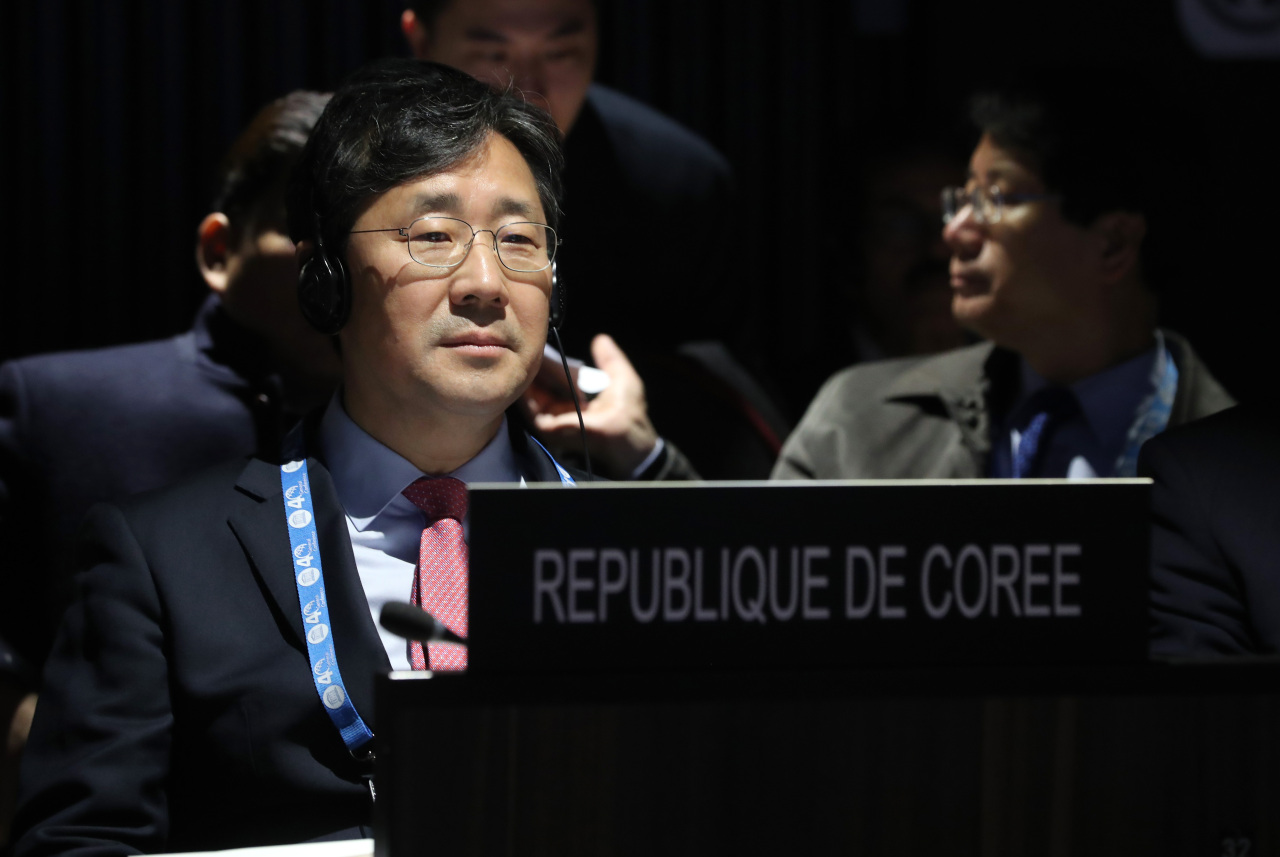PARIS -- As Korean culture gains influence around the world, the Ministry of Culture, Sports and Tourism is seeking to launch a pangovernmental team that would serve as a Hallyu control tower.
Culture Minister Park Yang-woo said the government is planning to support the Hallyu in a way that will enable it to have a positive influence in diverse fields, in addition to culture.
“I believe Hallyu should be linked to other fields like export, manufacturing and service industries. For this, there needs to be a system that allows cooperation among multiple government branches,” Park told reporters during his visit to Paris.
Park explained that the government’s support for Hallyu is threefold: diversification to encompass not only familiar cultural areas such as K-pop, drama and video games, but also culinary, fashion and traditional culture; diversification of regions of influence, so that the Hallyu can spread into the European and American markets in addition to Asia; and the expansion of Korean culture into fields such as tourism and exports of consumer goods.
The Hallyu support team will operate within the Culture Ministry but will include officials from other government bodies as well. “We (the ministry) are holding final negotiations with the Ministry of Interior and Safety, and we hope to launch the team within this year,” he said.
 |
Park Yang-woo (Ministry of Culture, Sports and Tourism) |
Park stressed the significance of two Korean cultural centers in continental Europe in the government’s mission to widen the influence of Hallyu.
The Korean Cultural Center in Budapest, Hungary, reopened Monday in a new six-story building, and the Korean Cultural Center in Paris was to reopen in a new location Wednesday as the Paris Korea Center.
“I believe the cultural center in Paris is significant as an outpost in spreading Korean culture across entire Europe,” he said. “While Eastern Europe market is not a huge market for us (yet), it has great potential.” Park also gave a midterm self-assessment of the culture policies of the Moon Jae-in administration.
“For the past 2 1/2 years, despite some complaints about the economy and political struggles, people’s participation in cultural activities has grown. Last year, the percentage of Koreans attending cultural events surpassed the 80 percent mark for the first time ever, which has great significance,” he said.
The percentage of people engaging in cultural activities -- such as going to a movie or a play -- was 81.5 percent in 2018, up from 78.3 percent in 2016. The average amount people spent on leisure activities during the same period rose from 136,000 won ($116) to 151,000 won per month, and the average time people spent on those activities rose from 3.1 hours per day to 3.3 hours.
“In terms of tourism, the number of foreign visitors to Korea dropped from 17.24 million in 2016 to 15.3 million in 2018 due to the THAAD situation,” he said, referring to the recent dispute between Seoul and Beijing over the deployment of the US Terminal High Altitude Area Defense system in South Korea. “But due to the government’s seamless diplomatic efforts towards China, we expect the number to jump back to around 17.4 million this year.”
Park also addressed the controversy surrounding alternative forms of military service for K-pop stars, including BTS.
All able-bodied Korean men are required to serve in the military for some two years, but those with outstanding accomplishments in their fields -- particularly in the areas of culture and sports -- are allowed to work in their respective fields for the same period of time as an alternative to joining the military service.
Although specific criteria exist for fields like classical music and sports -- such as Olympic medals and gold medals in the Asian Games -- no criteria exist for pop culture figures, despite calls to grant such benefits to global pop sensations like BTS.
“Personally, I would like to exempt the military service for BTS, but the Military Manpower Administration and the Ministry of National Defense are leaning toward reducing the (alternative service) system. And it is hard to set a specific criteria for pop culture,” Park said.
“In addition, a lot of the agencies are for their stars serving in the military,” he said. The BTS members have made it clear that they intend to serve in the military.
“There has been talks (within the government) about adding changes so as to retain the alternative service system, but allow these people (like BTS) to contribute to the society.
“Male celebrities who have yet to serve in the military and are 25 or older have restrictions in traveling abroad. There have been talks about removing such restrictions upon recommendation of the culture minister,” Park said.
Of the seven members of BTS, Jin, Suga, J-Hope and RM are over 25.
By Yoon Min-sik (
minsikyoon@heraldcorp.com)
Korea Herald Correspondent








